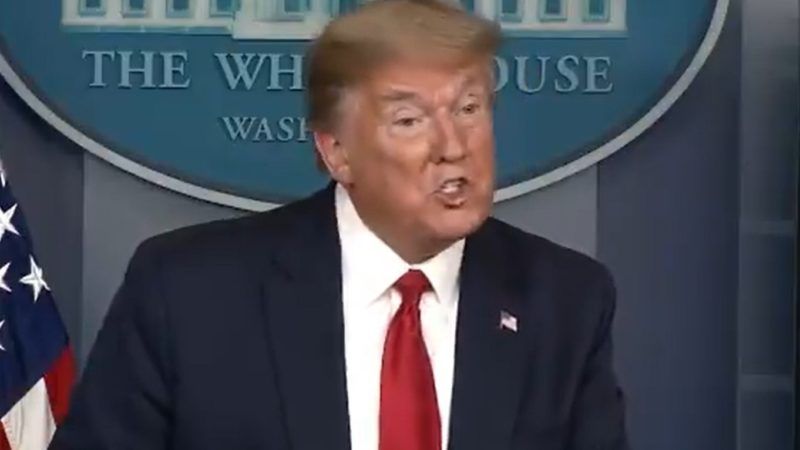We Don't Need a Psychiatric Diagnosis To Assess the President's Obvious Faults
No amount of psychoanalyzing can disguise the grim choice facing voters this fall.

Anti-Trump D.C. lawyer George Conway, who somehow has managed to remain married to senior White House adviser Kellyanne Conway, offers a characteristically harsh take on the president in a recent Washington Post op-ed piece. His assessment of Donald Trump as a narcissistic, erratic, impulsive, mendacious, petty bully with modest intellectual abilities is familiar and, I think, essentially accurate. But in the midst of describing the conspicuous evidence of these character traits, Conway tries to bolster his portrayal by citing "tens of thousands of mental-health professionals" who have "test[ed] the bounds of professional ethics" by "warn[ing] for years about Trump's unfitness for office."
Far from clinching Conway's evaluation, that citation makes it less credible. If Trump's "unfitness for office" is as glaringly obvious as Conway argues, why would we need "mental-health professionals" to verify that conclusion? And what do those experts add to our understanding of Trump's manifold shortcomings, which were clear long before he was elected and have been on public display every day of his presidency? Absolutely nothing. By dressing up a political judgment as a quasi-medical diagnosis, Conway, who describes Trump as "deranged" and "nuts," clouds the issue while alienating anyone who is appropriately skeptical of psychiatry's audacious claim to dominion over all human foibles and failings.
The most commonly suggested psychiatric label for Trump is "narcissistic personality disorder," which is diagnosed based on five or more of these eight criteria:
1) a grandiose sense of self-importance
2) a preoccupation with fantasies of unlimited success, power, brilliance, beauty, or ideal love
3) a belief that one is special or unique and can be understood only by, or should associate with, other special or high-status people
4) demands for excessive admiration
5) a sense of entitlement
6) taking advantage of others for one's own advancement
7) lack of empathy
8) envy
The "mental-health professionals" who impress Conway so much are not wrong in thinking that Trump seems to display these traits. But in taking the further step of saying he therefore suffers from a "mental disorder" that renders him unfit for the presidency, they are not only violating the American Psychiatric Association's stricture against diagnosing people from afar; they are lending a pseudoscientific veneer to a judgment that mere laymen are perfectly capable of rendering on their own.
The qualities that offend Conway were readily apparent to anyone who paid attention to the 2016 presidential campaign, or for that matter to Trump's decades as a public figure prior to that. Almost half of voters nevertheless were willing to give him a try. Conway argues that Trump's performance in office, and especially his response to the COVID-19 pandemic, shows they were dangerously mistaken. That is a plausible political argument, but appeals to psychiatric authority do not make it any stronger.
Even voters who are persuaded by Conway's case against Trump can hardly be enthusiastic about the leading alternative. Joe Biden's nomination, like Trump's, demonstrates nothing so much as the pathetic inadequacy of his rivals and the party from which they emerged. The former vice president's main qualification, aside from a long résumé featuring myriad terrible policy judgments, is that he is not Donald Trump. And while Trump's opponents lean heavily on a psychiatric construct that tells us nothing about him we did not already know, Biden, long notorious for gaffes and weird speech patterns, lately has been showing signs of an age-related cognitive decline that could make the 77-year-old candidate, who would be the oldest president Americans have ever elected, mentally unfit for office.
Based on what I know about both of these men, I am not comfortable trusting either of them to preside over the federal government. Justin Amash, the Michigan congressman seeking the Libertarian presidential nomination, is vastly preferable by pretty much every measure. And while a President Amash might be no more than a pleasant fantasy, that is all we are left with in a political system that persistently produces choices that are not just uninspiring but alarming.